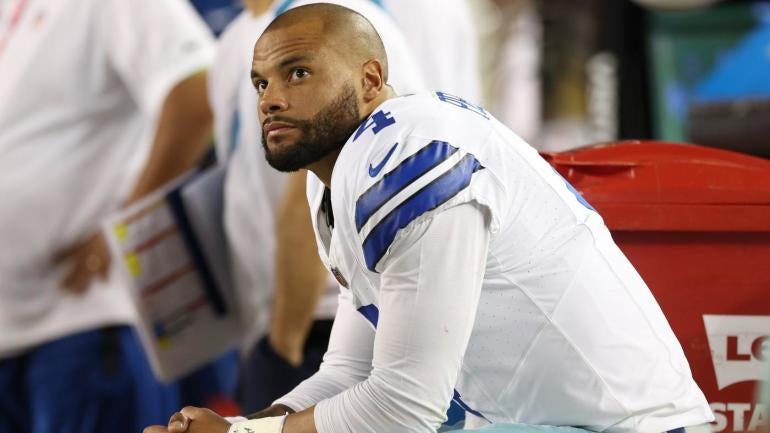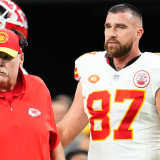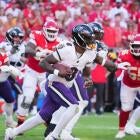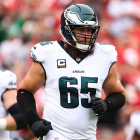Agent's Take: Exploring what a cap on exploding QB salaries could look like, steps necessary for it to happen
Some NFL owners have reportedly discussed the matter recently

Detroit Lions quarterback Matthew Stafford was the NFL's highest-paid player at $27 million per year when the 2017 regular season began. He had just signed a five-year, $135 million contract extension.
Quarterback salaries skyrocketed over the next few years. By the start of the 2023 regular season, Cincinnati Bengals quarterback Joe Burrow was the league's highest-paid player with his five-year, $275 million extension averaging $55 million per year.
The top of the quarterback market more than doubled during those six years. By contrast, the salary cap increased by 34.61% from $167 million in 2017 to $224.8 million in 2023. Even if there hadn't been a sharp decrease in the salary cap in 2021 because of the COVID pandemic, the growth in quarterback salaries would still easily dwarf the growth in salary cap over that span.
NFL Network's Tom Pelissero recently mentioned in an interview on "The Rich Eisen Show" that a select group of owners have discussed a cap on quarterback salaries. He acknowledged that the idea hasn't really gained traction yet because numerous teams have already given lucrative contracts to quarterbacks.
Nonetheless, it may be more than a coincidence that Pelissero disclosed the information last month a few days after Jacksonville Jaguars quarterback Trevor Lawrence tied Burrow, 2020's first overall pick, as the league's highest-paid player at $55 million per year. Lawrence, 2021's first overall pick, isn't nearly as accomplished as Burrow through three NFL seasons. He didn't live up to expectations last season. The Jaguars also imploded down the stretch by losing five of the last six games to miss the playoffs after being in control of the AFC South with an 8-3 record.
The NFL collective bargaining agreement, which expires at the end of the 2030 league year in March 2031, doesn't give owners the discretion to create a mechanism to limit quarterback compensation. It could be done with an amendment to the current CBA through agreement with the NFL Players Association, which is the players union. The NFLPA would likely have a laundry list of concessions to seriously entertain the notion.
It wouldn't be the first time owners wanted to curb salaries they deemed were out of control. Owners felt that something needed to be done with the compensation of top draft picks because unproven commodities were being paid like Pro Bowlers without playing an NFL game. The 2011 CBA drastically reduced salaries for early first-round picks by implementing a rookie wage scale. Quarterback Sam Bradford, the final pre-rookie wage scale first overall pick in 2010, received a six-year contract worth a maximum of $86 million containing a then-NFL record $50 million in guaranteed money. Bradford made slightly over $78 million during the six years of his rookie deal although he missed a season and half worth of games because of two ACL tears in his left knee.
As the first overall pick in 2011, quarterback Cam Newton signed a fully guaranteed four-year, $22,025,498 contract, which included a $14,518,544 signing bonus, with the Carolina Panthers. He had the potential to make slightly under $37 million over five years because of the inclusion of a fifth-year option teams have for first-round picks. It was a far cry from the deal Newton would have signed if the system hadn't changed.
The NBA owners went through a similar reckoning as some NFL owners are advocating near the end of the 20th century. A largely unproven Kevin Garnett signing a six-year, $126 million extension with the Minnesota Timberwolves in 1997 was a catalyst for owners locking out NBA players after the 1997-98 season playoffs ended. Owners successfully fought for salary maximums through a lengthy work stoppage that shortened the 1998-99 season to 50 regular-season games.
Previously, players who had been with a team for at least three consecutive seasons could re-sign with their own teams for as much as could be negotiated under the Larry Bird exception to the NBA's soft salary cap. Because of salary maximums, it wasn't until the 2017-18 season that an NBA player made more than the $33.14 million Michael Jordan did for the 1997-98 season with the Chicago Bulls.
The Bird exception remains in existence, subject to salary maximums. The ceiling on player salaries with veteran contracts depends on years of service. The first year of a contract for players who have no more than six years of service can't exceed 25% of the salary cap. For players with seven to nine years of service, the maximum is 30% of the salary cap. Players with 10 or more years of service are restricted to 35% of the salary cap. There are limited instances in which players in the lower two service time categories can qualify for the 35% salary maximum because of performance under what is referred to as a supermax contract.
There are currently 10 quarterbacks with contracts averaging $45 million or more in the NFL. Their average yearly salaries relative to the salary cap in existence when signed range from Kirk Cousins' 17.62% with the four-year, $180 million contract averaging $45 million per year he received from the Atlanta Falcons in March under the current $255.4 million salary cap, to
Burrow's 24.47% on his $55 million-per-year deal when the salary cap was $224.8 million in 2023. The average salary cap percentage at signing for the 10 contracts is 21.95%.
Based on these contracts, the average yearly salary of quarterbacks being restricted to 22% of the league-wide salary cap at signing would seem reasonable for an upper limit on quarterback pay. Existing deals that exceed 22% would be grandfathered in so the Bengals and Burrow wouldn't have to rework his deal. It would also make sense that there wouldn't be strict rules on the annual increases for each year, like with NBA contracts which are fully guaranteed. Teams and the agents of players would still have wide latitude to negotiate the structure, the cash flow, guarantees and other components of the deal.
Certain owners having any discussions about limiting quarterback pay should be alarming to the NFLPA. Cowboys quarterback Dak Prescott could be a litmus test, especially if he plays out his contract and becomes an unrestricted free agent in 2025.
Conventional wisdom suggests Prescott should one of the most sought after free agents ever provided he doesn't have a stunning collapse in 2024 along the lines of Russell Wilson's first season with the Denver Broncos after being acquired from the Seattle Seahawks in a 2022 offseason trade. A healthy Pro Bowl-caliber quarterback in his prime is never available on the open market. Prescott turns 31 years old at the end of July.
A soft market for Prescott under these favorable circumstances where he didn't significantly move the needle for quarterbacks financially would be surprising. The NFLPA would view the lack of interest as a tacit agreement among owners to hold the line on quarterback salaries. This would surely result in charges of collusion by the NFLPA. There would be some parallels to Lamar Jackson last offseason when he was designated as a non-exclusive franchise player by the Ravens. Curiously, some quarterback needy teams where Jackson would have been a significant upgrade were quick to publicly state there wouldn't be an interest in him.
A market for the two-time NFL's MVP services never developed before he agreed to a five-year, $260 million contract averaging $52 million per year at the end of April 2023 to make him the league's highest-paid player. Jackson's self-representation shouldn't have been an impediment to teams bringing him in for a visit to determine whether exploring an offer sheet that may have been difficult for the Ravens to match was feasible.
Ultimately, the NFLPA filed a grievance alleging teams and the league colluded to prevent fully guaranteed contracts from being offered to players. The grievance is still pending. Jackson was insistent on a fully guaranteed contract during negotiations with the Ravens in 2022 after the Cleveland Browns gave quarterback Deshaun Watson a completely secure five-year, $230 million contract in connection with his March 2022 trade from the Houston Texans. Jackson finally relented on a fully guaranteed contract once quarterback Jalen Hurts signed a conventional five-year, $255 million extension with the Philadelphia Eagles averaging $51 million per year that put him atop the NFL salary hierarchy in April 2023.
The basis for the NFLPA's claim is that no other quarterback or high-profile player has signed a fully guaranteed contract after Watson. The NFLPA contends that fully guaranteed contracts should have become the norm for the NFL's top players because of the Watson deal. The NFLPA alleges that prior to, during and after an August 9 ownership meeting in which the owners met to approve the Broncos sale to an ownership group led by Walmart heir Rob Walton, there were discussions among owners, league and teams executives about agreeing not to sign veteran players to lucrative fully guaranteed contracts.
Collusion is hard to prove. The NFLPA would likely need some sort of "smoking gun" to prevail in a claim relating to Prescott that could allow for the termination of the CBA. Obtaining electronic communications (texts and/or emails) of NFL owners and/or team executives relating to the depression of quarterback salaries would surely qualify.

















